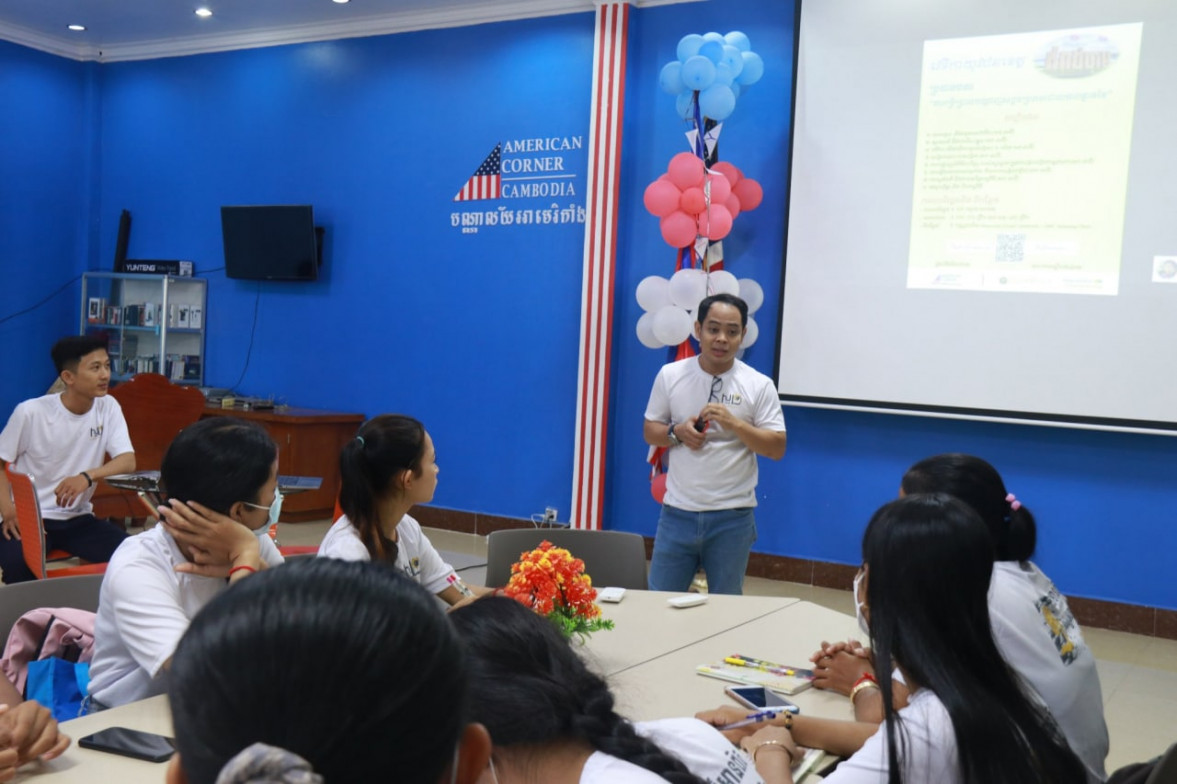
If Noting Else, Stop Lecturing Youth from Consuming Entertainment Content

Writren by: Leng Hywfi, Sour Mouy Digital Media Campaign Coordinator

Photo Credit: American Corner Cambodia - UME, Kampong Cham
Intuitively, digital natives who have grown up under the influence of the internet and modern ICT know how to use technology, digital devices, and social media, so they don’t feel the need for digital education or training. It resonates with Sour Mouy’s human center research design in late 2021 when our researchers said both urban and rural youths if they need digital and social media training. None of them said they need.
However, young people (digital natives) are not inherently equipped with the skills for safe and effective use of technologies and social media yet. They have actually acquired those technological skills informally because they have spent time exploring and playing with those technologies. They are likely to be incomplete, and not critical enough when it comes to communicating substances via social media. The failure to offer youth digital literacy and critical thinking skills in using technologies and social media would put them into risky positions and create a new digital divide between digital lifestyle skills and digital workplace skills.
In the digital era, we know that the traditional forms of entertainment and other social activities have been physically reduced but technologically integrated and found on social media. The digital natives have experienced lesser physical engagements as they start virtually socializing and accessing those online entertaining programs. With increased accessibility to smartphones and internet connections, youth have spent more time on social media. Sour Mouy’s human center research design found that provincial youth (with at least grade 12 education) and Phnom Penh youth (students) spend an average of 3 hours and 30 minutes per day on social media.
While rural youth with lower education and income spend an average of 4 hours and 40 minutes per day on social media. Their popular content includes short video clips of TV shows, dramas, comedy, and posting photo stories whose content triggers specific emotions related to heartache, family obligation, being poor and rejected or disconnected, low self-esteemed, lonely, ashamed, self-pity, love-seeking, etc.
Are we expected them to be consuming educational and informative content while they need online entertaining content given that physical options are not available, and being less connected with their peers or childhood friends? I believe that issue is not about being pessimistic or disappointed about them consuming overly entertaining content, but rather giving them options in terms of content and motivations to move out of the content which is algorithmically set.
I personally believe that the solution is not to keep complaining about them not consuming informative and useful content you want them to do, but to socialize them to access to other content that helps them aware of online risks and security and improves their critical thinking skills. Based on a series of roundtable discussions Sour Mouy conducted with youth in Siem Reap, Kampong Cham, and Phnom Penh in July 2022, we suggested several options to engage those youth:
- Providing new educational and useful content options (not what algorism gives them): campaigners can break the silo by introducing educational and thoughtful content in social media through community influencers who they know and follow to provide them with regular entertaining content by gradually changing to the infotainment, self-help tips, skills, and knowledge that they can benefit from social media.
- Using social media to create skills: since the first thing most of us do just after waking up is to check our social media so why don’t we try to make social media a school? Those who need to have skills such as cooking, basic construction work, planting or animal raising, etc to promote livelihoods can use social media as a place for such information and knowledge enrichment. For instance, a husband of Sour Mouy’s informant in Ratanakiri has become a recognized skilled construction worker in his community when he keeps watching YouTube videos on construction work. The campaign to showcase such real examples of rural youth who has changed their life after using social media as a school is paramount.
- To be critical is an easier said than done phrase. We don’t lecture them with our scripted lines, but we post thought-provoking questions related to their current situations and invite them to think, reflect and compare what they know and experience with what the social media stars are speaking about. Critical thinking is inculcated when people are open to sharing opinions and listening to others and various sources of information.
- Having too much information on social media creates confusion, so there should be online content on how to create discipline, clarity, and a positive mindset. Yuval Noah Harari says, “in a world deluged by irrelevant information, clarity is power.” For the rural youth, we have talked with, having clarity in mind is very hard since they have a limited base of critical thinking or cross-checking. However, clarification can be done via giving a short pause and thinking, checking the sources, and being less reactive to social media trends in terms of sharing and commenting.
- Youth should also be informed about digital well-being on their smartphones. Being completely disconnected from social media is not easy and healthy either because it is like we are disconnected from a society already. However, setting time limitations to ensure health, effective and quality time on social media would help especially when they are hectic with their studies or other family commitments.




